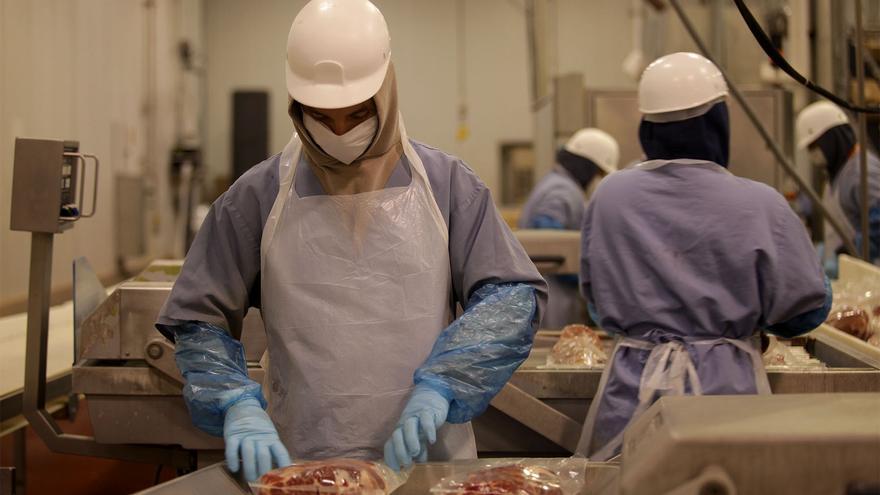
![]() 14ymedio, Madrid, 22 April 2022 — Cuba is already the main destination for Mexican chicken meat and the cooperation will go further. Representatives of the Island’s Ministry of Agriculture visited thirty slaughterhouses that will supply beef, pork and poultry to Cuba, according to the local press.
14ymedio, Madrid, 22 April 2022 — Cuba is already the main destination for Mexican chicken meat and the cooperation will go further. Representatives of the Island’s Ministry of Agriculture visited thirty slaughterhouses that will supply beef, pork and poultry to Cuba, according to the local press.
The Cuban authorities renewed the endorsement for 14 and authorized, for the first time, 16 federal ’inspection-type establishments’, as the facilities regulated by the Ministry of Agriculture for the slaughter of animals, as well as their processing, packaging, packing, refrigeration, and industrialization for human consumption are called in Mexico.
Of these, some are in Jalisco, others in Yucatan, Mexico City, State of Mexico, Michoacán, Guanajuato and Veracruz.
Unable to produce meat for domestic consumption, after having been a net exporter in the 1950s, Cuba is forced to seek it abroad to import it, which entails a high economic cost. Its main supplier is the United States, against which the quantity acquired in Mexico pales in comparison.
According to Mexican data, last year 8,600 tons of pork and poultry products were exported to Cuba. In the same year, 307,658 tons of chicken alone were purchased from the United States, despite the fact that the embargo forces the island to buy under conditions unusual in international trade, specifically that Havana must make the payments in cash and in advance.
Since Andrés Manuel López Obrador came to power in Mexico in 2018, his country’s cooperation with Havana has increased in all areas. This Wednesday, Cuban President Miguel Díaz-Canel highlighted “the endearing ties of friendship, history and culture” that unite both countries.
In addition to kicking off the Havana International Book Fair this week with Mexico as the guest of honor, several cultural agreements were signed this Tuesday. One of them refers to the cooperation, preservation and access to digital heritage, and the other addresses collaboration for the conservation, preservation and dissemination of bibliographic collections.
A statement published on the official website of the Cuban Ministry of Foreign Affairs explains that the fundamental purpose of the agreements is to expand and strengthen bilateral ties in terms of preservation and protection of documentary and bibliographic heritage.
Mexico’s Secretary of Foreign Affairs, Laura Beatriz Moreno, present in Havana, said that the purpose of these agreements is to preserve the historical memory of both nations and to highlight “their historical relations of friendship and cooperation.”
The gesture was reciprocated by Díaz-Canel, who was full of praise for the “most worthy country in Latin America when the whole world closed doors to us in the first years of the Revolution” and has maintained “that friendship, that affection and support.”
“These are the bridges that are stronger than any other type of relationship, they are the bridges that we must continue to aspire to rebuild, to strengthen, that can be an example for a world that in the midst of the pandemic is thinking about wars when it should be thinking about how all our efforts were focused on saving human lives,” he added.
López Obrador will visit Cuba between May 5 and 9, as a part of a tour that will also take him to El Salvador, Honduras, Guatemala and Belize, and where the Mexican president plans to address the issue of the wave of migration in the region.
Díaz-Canel has been to Mexico three times. The first, at the inauguration of López Obrador, in 2018, the next in 2019, and the last in 2021, to attend the CELAC summit and the celebrations for the independence of the neighboring country.
Cuba and Mexico have maintained uninterrupted diplomatic relations for 117 years, although with ups and downs, especially during the mandate of the conservative president Vicente Fox (2000-2006).
The subsequent return of the Institutional Revolutionary Party (PRI) to the presidency, led by Enrique Peña Nieto (2012-2018), improved ties between the two countries and with the arrival of former ’priista’ López Obrador to power they have gained a new impulse.
____________
COLLABORATE WITH OUR WORK: The 14ymedio team is committed to practicing serious journalism that reflects Cuba’s reality in all its depth. Thank you for joining us on this long journey. We invite you to continue supporting us by becoming a member of 14ymedio now. Together we can continue transforming journalism in Cuba.
